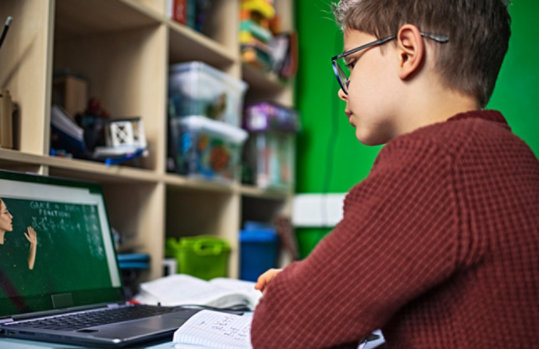Choosing the best computer for students is one of the first steps toward academic success, but what should you look for? Here are three guideposts for finding the right computer for your student.

Students need powerful PCs with innovative form-factors to match a wide variety of assignments and ways to learn. With 2-in-1 laptops, they can switch from tablet mode to laptop mode to find what works best for each specific task and their unique learning styles.
Speaking of which:
One word: touchscreen. If you’re looking for the best laptop for students, consider one with a touchscreen. Many of today’s students grew up using smartphones. Touching the screen is how they interact with devices. This naturally translates to computers with a touchscreen interface, and they can incorporate all the inputs they want—touch, mouse, pen, and keyboard.
Oh, the options you have! From 2-in-1s to tablets and laptops, of all different sizes—there are a variety of form-factors from respected manufacturers like Dell, HP, and Lenovo to choose from. You’ll find an option that’s perfect for your student’s needs and style.
Sounds expensive, right? You’d be surprised at the laptop deals you can find. Whether your budget is $300 or $1,300, you can find the best computer for your student, wherever they are.
To choose the best laptop for students, here’s what you should look for:

Learning styles vary greatly. Some students are visual learners, whereas others are more hands-on. Some read to understand; others listen or talk to understand. Some students struggle to read, write, or speak.
If you’re looking for the best computer for a student, be sure to choose one with outstanding accessibility features aligned with their learning style. This is where Windows PCs shine; compatibility and built-in accessibility features that over 1 billion users enjoy worldwide. Maybe your student needs to make everything easier to see by adjusting text size and color or boosting contrast. Or they may prefer to have items read aloud to them by using the built-in screen reading app, Narrator. Whatever their preferences, your student can customize their computer to work best for how they want to use it, where they want to use it.
Some laptops even come with touchscreens and digital pens that allow students to take notes as naturally as they would on paper. Just switch from laptop to tablet mode on 2-in-1 laptops—it’s ideal for math and physics problems! Research even shows that students who use a digital pen for science classes showed a 38% increase in performance.¹
If you start your student off with an Intel-based Windows PC in college, they’ll likely have four years of experience with the platform by the time they graduate (eight if they start in high school! Up to 12 if they start in elementary school!). And with Fortune 500 companies looking for computer literacy to get their work done, you’re setting students up for success in the job market ahead. Internship or entry-level role, you’ll be giving your student an advantage by ensuring they’re tech-savvy for many work environments.
This also applies to those who want to blaze their own path. If your student is looking to be a future entrepreneur, give them the best technology to make it happen.
With a Windows 11 computer, your student can take on any challenge from the first day of school to graduation and beyond. Convenience, compatibility, built-in intelligent features that learn and adapt—combine all that with the speed and responsiveness of 12th Gen Intel® Core™ processors, and you’ve got a formula for success.




Share this page